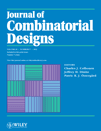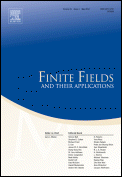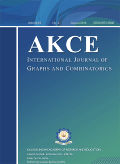
JOURNAL OF COMBINATORIAL DESIGNS
Scope & Guideline
Fostering Insights in Combinatorial Theory and Practice
Introduction
Aims and Scopes
- Combinatorial Designs and Block Designs:
The journal publishes research on various types of combinatorial designs, including balanced incomplete block designs (BIBDs), Steiner systems, and group divisible designs. These studies often explore existence, constructions, and properties of such designs. - Graph Theory and Combinatorics:
Papers frequently delve into graph-theoretical aspects of combinatorial designs, examining topics like chromatic numbers, graph decompositions, and properties of specific graph classes. - Coding Theory and Error-Correcting Codes:
Research articles often bridge combinatorial designs with coding theory, discussing topics such as maximum distance separable (MDS) codes, orthogonal arrays, and the construction of codes from combinatorial structures. - Algebraic Combinatorics:
The journal includes studies that apply algebraic techniques to combinatorial problems, such as using group theory to classify designs or analyze their symmetries. - Algorithmic and Computational Aspects:
Many publications focus on the algorithmic side of combinatorial designs, including complexity analysis, enumeration problems, and computational methods for constructing and analyzing designs.
Trending and Emerging
- Advanced Algebraic Techniques:
There is a growing trend towards employing advanced algebraic methods in the study of combinatorial designs, such as the use of group theory and algebraic structures to derive new results and insights. - Interdisciplinary Applications:
An increase in research that applies combinatorial designs to other fields, such as computer science, optimization, and telecommunications, indicates a trend towards interdisciplinary collaboration and application of combinatorial principles. - Complexity and Algorithmic Studies:
Recent works focus heavily on algorithmic aspects of combinatorial designs, exploring computational complexity, efficient algorithms for construction, and enumeration algorithms, reflecting an increased interest in practical applications of theoretical results. - Graph-Theoretic Connections:
A notable rise in studies that explore connections between combinatorial designs and graph theory, particularly concerning properties of specific graph classes and their applications in coding and design theory.
Declining or Waning
- Elementary Construction Techniques:
Papers that focus solely on elementary construction methods for combinatorial designs seem to be declining. The trend is shifting towards more sophisticated and algebraic methods, moving away from simpler approaches. - Historical Perspectives and Classical Results:
There has been a noticeable reduction in papers that review historical perspectives or revisit classical results in combinatorial designs. The focus is increasingly on novel contributions rather than historical recounting. - Basic Enumeration Problems:
While enumeration remains a relevant topic, basic enumeration problems are being replaced by more complex and nuanced studies that integrate combinatorial designs with other mathematical fields, indicating a shift towards interdisciplinary approaches.
Similar Journals

JOURNAL OF ALGEBRAIC COMBINATORICS
Exploring the intricate dance of numbers and structures.JOURNAL OF ALGEBRAIC COMBINATORICS, published by SPRINGER, stands as a premier resource in the fields of algebra and combinatorics, playing a pivotal role in advancing research in these disciplines. With an esteemed impact factor reflective of its academic rigor, it holds a prestigious Q1 ranking in both Algebra and Number Theory, as well as in Discrete Mathematics and Combinatorics, according to 2023 assessments. Established in 1992, this journal features contributions from leading experts worldwide, offering insights into the latest developments and methodologies. Although not an open-access journal, it provides a wealth of valuable information and research findings focusing on combinatorial structures, theory, and applications that are essential for advancing academic inquiry. As a vital publication for researchers, professionals, and students alike, JOURNAL OF ALGEBRAIC COMBINATORICS continues to shape the conversation within the mathematical community and beyond, making it indispensable for those engaged in the dynamic landscape of mathematical sciences.

Journal of Combinatorics
Exploring the Depths of Combinatorial TheoryJournal of Combinatorics is a premier academic journal dedicated to advancing the field of combinatorial theory and its applications. Published by INT PRESS BOSTON, INC, it aims to provide a robust platform for researchers, professionals, and students to disseminate their findings and engage with cutting-edge developments in combinatorics. With a focus on high-quality, peer-reviewed articles, the journal fosters rigorous mathematical discussions surrounding various facets of combinatorial structures, graph theory, design theory, and combinatorial optimization. Although currently not available as an Open Access journal, the Journal of Combinatorics plays a vital role in enriching the mathematical sciences and serves as an essential resource for academics seeking to stay updated with the latest trends in combinatorial research. By maintaining a commitment to excellence and innovation, this journal is indispensable for anyone looking to deepen their understanding in this critical area of study.

Discrete Mathematics Letters
Empowering research through open-access knowledge.Discrete Mathematics Letters is a prominent open-access journal dedicated to advancing the field of Discrete Mathematics and Combinatorics, published by Shahin Digital Publisher. Since its inception in 2019, this journal has rapidly established its presence in the academic community, securing a respectable Q2 category ranking in the 2023 Scopus database, positioning itself at rank #45 out of 92 in its field, making it a valuable resource for researchers and practitioners alike. With a commitment to disseminating high-quality research, Discrete Mathematics Letters provides an accessible medium for sharing innovative ideas and findings within the mathematical sciences, ensuring that researchers, students, and professionals stay informed about the latest developments. As an open-access journal, it provides free access to publications, fostering collaboration and knowledge exchange among the global research community.

FINITE FIELDS AND THEIR APPLICATIONS
Innovating Through the Lens of Finite Fields and Their Applications.FINITE FIELDS AND THEIR APPLICATIONS is a premier academic journal published by Academic Press Inc. Elsevier Science that focuses on the interdisciplinary study of finite fields and their diverse applications across various domains of mathematics and engineering. With an ISSN of 1071-5797 and an E-ISSN of 1090-2465, this journal has established itself as a leading platform for researchers, professionals, and students aiming to explore advancements in Algebra and Number Theory, Applied Mathematics, and Engineering. Awarded a Q1 ranking in multiple categories by Scopus in 2023, this journal features rigorous peer-reviewed articles that contribute to both theoretical developments and practical applications, reflecting its relevance within the mathematical sciences community. The journal's convergence over the years from 1995 to 2024 highlights its sustained commitment to quality research, making it an invaluable resource for those seeking to deepen their understanding of finite fields and their significance in contemporary mathematical discourse.

AKCE International Journal of Graphs and Combinatorics
Fostering Global Collaboration in Discrete Mathematics.AKCE International Journal of Graphs and Combinatorics, published by TAYLOR & FRANCIS LTD, serves as a significant platform in the field of Discrete Mathematics and Combinatorics. With its commitment to open access since 2015, the journal ensures that cutting-edge research is readily available to a global audience, promoting the dissemination of knowledge and high-quality scholarship. Recognized for its impact in the discipline, the journal is currently ranked Q3 in its category for 2023 and holds a commendable Scopus ranking, falling within the 69th percentile. Researchers, professionals, and students alike will find invaluable insights and contributions in this journal, which spans a wide range of topics related to graph theory and combinatorial structures. Operating from its base in India, and converging from 2011 to 2024, the AKCE International Journal invites submissions that push the boundaries of mathematical exploration and foster innovative methodologies in a rapidly evolving field.

APPLICABLE ALGEBRA IN ENGINEERING COMMUNICATION AND COMPUTING
Innovating Communication and Computing through AlgebraAPPLICABLE ALGEBRA IN ENGINEERING COMMUNICATION AND COMPUTING is a distinguished journal published by Springer, dedicated to advancing the fields of algebra and applied mathematics within engineering contexts. With an ISSN of 0938-1279 and an E-ISSN of 1432-0622, this journal has established itself as an essential resource for researchers, professionals, and students interested in the intersection of algebraic theory and practical applications in communication and computing since its inception in 1990. As of 2023, it holds a commendable Q3 quartile ranking in both Algebra and Number Theory and Applied Mathematics, reflecting its significant contribution to these fields, particularly as it ranks 11th out of 119 in Algebra and Number Theory within Scopus. The journal is committed to publishing high-quality research, case studies, and theoretical advancements that bridge the gap between abstract mathematical concepts and real-world engineering solutions, fostering innovation and knowledge transfer. Despite not being open access, it remains a pivotal platform for disseminating cutting-edge research and is vital for those seeking to deepen their understanding of applicable algebra in a rapidly evolving technological landscape.

ARS Mathematica Contemporanea
Exploring New Dimensions in Algebra and TopologyARS Mathematica Contemporanea, published by UP FAMNIT in Slovenia, stands as a pivotal journal within the fields of algebra, number theory, discrete mathematics, geometric topology, and theoretical computer science. Since its inception in 2011, this journal has consistently provided a rich platform for innovative research, garnering a commendable Q2 category ranking in various mathematical domains, including Algebra and Number Theory, and Geometry and Topology, showcasing its growing influence and prestige in the academic community. With an increasing Scopus rank—particularly notable in Algebra and Number Theory at the 71st percentile—ARS Mathematica Contemporanea is dedicated to publishing high-quality, peer-reviewed content that advances the frontiers of mathematical knowledge. The journal’s commitment to open access ensures that valuable research is readily available to scholars, practitioners, and students alike, fostering collaboration and dissemination of ideas across the globe. As it converges towards its dedicated timeline extending to 2024, ARS Mathematica Contemporanea remains a crucial resource for those engaged in mathematical research, presenting an array of theoretical and practical insights that define contemporary mathematical discourse.

Contributions to Discrete Mathematics
Elevating research standards in discrete mathematics.Contributions to Discrete Mathematics, published by the Department of Mathematics and Statistics at the University of Calgary, serves as a vital platform for disseminating innovative research within the dynamic field of discrete mathematics and combinatorics. Established in 2008, this journal has rapidly gained recognition, currently holding a Q3 classification in discrete mathematics and combinatorics for 2023. As it aims to foster academic dialogue and share groundbreaking discoveries, the journal showcases high-quality peer-reviewed articles that cover a range of topics, from theoretical explorations to practical applications. Although it currently operates under a traditional subscription model, there is a growing commitment to enhancing access options, ensuring that critical knowledge is available to researchers and practitioners alike. With its notable Scopus ranking of #50 out of 92 within its category, this journal is positioned as an important resource for students, academics, and industry professionals who seek to stay at the forefront of discrete mathematics research.

Australasian Journal of Combinatorics
Shaping the Future of Combinatorial TheoryThe Australasian Journal of Combinatorics, published by the CENTRE DISCRETE MATHEMATICS & COMPUTING, serves as a vital platform for researchers and professionals engaged in the dynamic field of discrete mathematics and combinatorics. With an ISSN of 2202-3518 and an E-ISSN of the same, this journal has been committed to open access since 2014, ensuring that groundbreaking research is readily available to a global audience. Based in Australia, specifically at the Department of Mathematics, University of Queensland, this journal spans the years from 1996 to 2024, showcasing the evolution of combinatorial research over nearly three decades. Recognized in the 2023 category quartiles as Q3 in Discrete Mathematics and Combinatorics, it ranks 68th out of 92 in Scopus, reflecting its growing influence despite its current percentile of 26th. The Australasian Journal of Combinatorics is dedicated to fostering innovative research and theoretical development, making it a valuable resource for academics and students alike.

Annals of Combinatorics
Exploring the Frontiers of Discrete MathematicsAnnals of Combinatorics, published by Springer Basel AG, serves as a premier platform for innovation and research in the field of discrete mathematics and combinatorics. With an ISSN of 0218-0006 and an E-ISSN of 0219-3094, the journal captures the ongoing developments and breakthroughs that characterize this dynamic discipline, which plays a crucial role in various applications such as computer science, optimization, and statistical mechanics. The journal has been recognized as part of the Q2 category in the 2023 rankings for discrete mathematics and combinatorics, reflecting its significant contribution to the academic community. Researchers and educators alike benefit from its insightful articles that not only cover theoretical advancements but also practical implications. With convergence years spanning from 2005 to 2024, the Annals of Combinatorics continues to be an essential resource for anyone looking to deepen their understanding and explore new frontiers in combinatorial research.